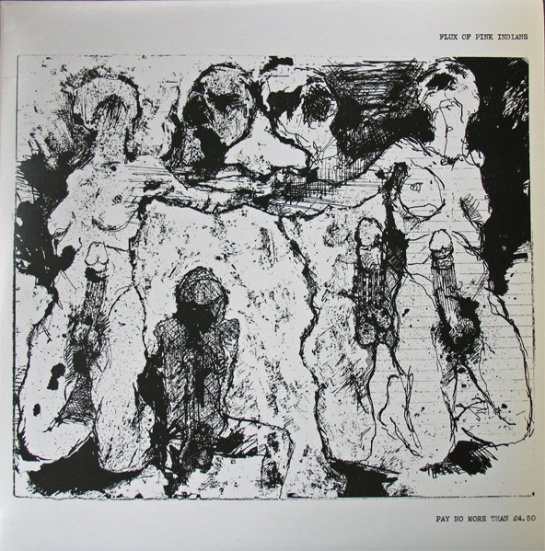Eardrum Buzz is an irregular Dubdog feature looking at key pieces of music that have altered my perception of exactly what music can be. See Eardrum Buzz (intro) for further context. All comments are highly subjective.

Title: The Fucking Cunts Treat Us Like Pricks
Author: Flux of Pink Indians
Label: Spiderleg Records
UK Release Year: 1984
2016 sees celebrations of the 40th anniversary of the birth of Punk with a very London centric focus. Halfway into the year and only a couple of months into the festivities, I am already sick of the sight of computer generated ransom lettering, dayglo colours and screened images. Don’t get me started on musical anthems from my youth being used in TV adverts—every time I see that McDonald’s / Buzzcocks’ advert I die a little inside.
But I was late to punk as a teenager, that was more my older brother’s era. I grew up with 2-Tone for my teenage rebellion, before getting into punk well after-the-fact. After getting into the first wave of punk bands several years from when they emerged, I fell for anarchopunk, as much for its political stance as its musical output. If I listen to much of that genre’s oeuvre today I find it embarrassing, but musically I still hold Crass and Flux of Pink Indians in high esteem. Both pushed the boundaries of what they did and challenged their fans to embrace more than just a three chord thrash with shouty animal rights lyrics. Their investigation into social and personal politics stretched to their craft—they were progressive, embracing free-jazz, noise, industrial, electronics, and in Flux’s case, dub and funk.
When, in 1985, I returned home after swapping 8 LPs I’d grown tired of at Colchester’s Parrot Records for Flux’s second album, little had prepared me for the assault my ears were about to receive. I assumed, very wrongly, I would be getting more of the same of their first release: Strive To Survive Causing The Least Suffering Possible. That was a concise metallic guitar/feedback thrash through shouty green anarchist lyrics, pithy and earnest with song titles such as: They Lie, We Die; We Don’t Want Your Progress; and Myxomatosis. It was sharp, to the point, aggressive and polemic. But as I had already fallen in love with the uncompromising artwork and title of their second album: The Fucking Pricks Treat Us Like Cunts, The Fucking Cunts Treat Us Like Pricks; I didn’t want the music to let me down.
My first impression, (after WTF have I swapped 8 LPs for?), was to ask myself whether I had a miss-pressing? The sound was muffled in places; the tracks didn’t seem to end but bled into each other; overdubbed electronic noises burst in and out; music stopped dead, punctuated with samples from different radio stations; the whole thing sounded like a complete racket. Which it is, of course. The first track starts with feedback, electronic vibrating noises, then what sounds like the band playing live punches in with several people yelping ‘punk punk punk punk punk punk punk punk…’ The music/noise was as uncompromising as the artwork and title.
So in the spirit of these Eardrum Buzz posts, why have I picked this record out as changing my perspective of just what music can be? Firstly because it taught me the value of not rejecting something on first listen—I learned to love this record. Secondly because it was deliberately challenging and it shocked me out of my then musical complacencies. Thirdly because I got into its experimental nature. This, I thought, is what punk should be all about. Not because it is aggressive, but because it is attempting to explore new ground beyond the conventional, and anarcho-punk, like punk rock before it, had become conventional with their rockisms and formulas.
Fucking Pricks… is punk, sure, but it is also noise, industrial, jazz, and Dada. It is also extremely and unapologetically political. Sure, there are moments of pious preaching when the noise abates and you can make out spoken lyrics. This is as only anarchopunk bands can be, and this is what I have come to wince at when listening back to the genre’s cast. In Flux’s case these are the weaker elements against the sonic overload that is the rest of this album, and these wince-inducing parts become inconsequential against the rest of the musical onslaught. But all that that aside, in 1985 the record felt exciting and it got my heart racing.
As it transpires, on looking back, it was an important record for me. Later I would get into Tackhead’s industrial funk and more recently I’ve been listening to a lot of free-jazz, things I’m convinced this record paved the way for my ears to appreciate when the time came for me to discover them. Fucking Pricks… taught me to give things a second listen, it reaffirmed in me that anything can be music, and that the more you become familiar with something that you don’t first understand, the more it can reward your senses as you spend time with it.
What would I make of it today if I heard it for the first time? I don’t know, I expect I would find it sprawling and in need of editing and honing. But I would still recognise its challenging nature, its uncompromising and brave approach, and its sense of perversion. In listening back to it for the first time in years before writing this post, I thought of it in comparison with the Buzzcocks advert and the 40th anniversary of the first wave of punk that McDonald’s have jumped on. In thinking about this, Flux of Pink Indians need high praise indeed for making something that no corporation could ever appropriate.
Other interesting articles on The Fucking Pricks… :
Uncarved
Public Embarrassment Blues

